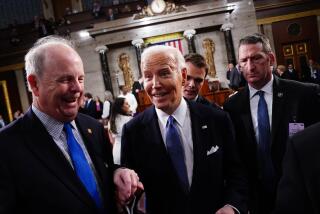President Obama’s public self-flogging on the Affordable Care Act

- Share via
It’s possible that President Obama felt better after that confessional, hour-plus press conference Thursday.
He had come to publicly flog himself for the disastrous Obamacare website rollout, comparing his role to that of a hapless football team captain: “If I fumble the ball, you know, I’m going to wait until I get the next play, and then I’m going to try to run as hard as I can and do right by the team. So, you know, ultimately I’m the head of this team. We did fumble the ball on it.”
He had also come to announce a temporary fix aimed at easing the outrage of many Americans who bought into his demonstrably untrue promise that “if you like your insurance policy you can keep it.”
But it’s hard to imagine that anyone besides his Republican antagonists was comforted by the mea culpa, or the newfound sense of transparency. Disappointed citizens, angry insurance companies, or freaked out Democratic legislators worried about their 2014 prospects probably didn’t feel a whole lot better after the president’s litany of disappointments.
In the course of an hour, he admitted he didn’t know what was going on with the website and that partly may have been due to the “insularity” of the White House. He acknowledged he misled people by promising them they could keep their plans, that it’s not easy to purchase a complicated product like health insurance online, that the federal government is ill-equipped to develop technology systems.
Here are seven issues Obama addressed, taken from a transcript posted by the Washington Post:
1. On why he allowed the Healthcare.gov website to be launched when it was failing internal tests:
“OK. On the website, I was not informed directly that the website would not be working the way it was supposed to. Had I been informed, I wouldn’t be going out saying, boy, this is going to be great. You know, I’m accused of a lot of things, but I don’t think I’m stupid enough to go around saying, this is going to be like shopping on Amazon or Travelocity, a week before the website opens, if I thought that it wasn’t going to work.
“So, clearly, we and I did not have enough awareness about the problems in the website. Even a week into it, the thinking was that these were some glitches that would be fixed with patches, as opposed to some broader systemic problems that took much longer to fix and we’re still working on them.
“So you know, that doesn’t excuse the fact that they just don’t work, but I think it’s fair to say, no...we would not have rolled out something knowing very well that it wasn’t going to work the way it was supposed to, given all the scrutiny that we knew was going to be on the website.”
2. On why he told people they could keep their insurance if they liked it:
“With respect to the pledge I made that if you like your plan you can keep it, I think, you know, and I’ve said in interviews, that there is no doubt that the way I put that forward unequivocally ended up not being accurate. It was not because of my intention not to deliver on that commitment and that promise. We put a grandfather clause into the law but it was insufficient.
3. On what he’s going to do to fix that:
“The other problem that has received a lot of attention concerns Americans who’ve received letters from their insurers that they may be losing the plans they bought in the old individual market, often because they no longer meet the law’s requirements to cover basic benefits like prescription drugs or doctor’s visits....
“I completely get how upsetting this can be for a lot of Americans, particularly after assurances they heard from me that if they had a plan that they liked they could keep it. And to those Americans, I hear you loud and clear. I said that I would do everything we can to fix this problem. And today I’m offering an idea that will help do it.
“Already people who have plans that pre-date the Affordable Care Act can keep those plans if they haven’t changed. That was already in the law. That’s what’s called a grandfather clause that was included in the law. Today we’re going to extend that principle both to people whose plans have changed since the law took effect and to people who bought plans since the law took effect....The bottom line is insurers can extend current plans that would otherwise be canceled into 2014. And Americans whose plans have been canceled can choose to re-enroll in the same kind of plan.”
4. On why the federal government is so bad at technology systems:
“There aren’t a lot of websites out there that have to help people compare their possible insurance options, verify income to find out what kind of tax credits they might get, communicate with those insurance companies so that they can purchase, make sure that all of it’s verified, right? So there’s just a bunch of pieces to it that made it challenging.
“And you combine that with the fact that the federal government does a lot of things really well. One of the things it does not do well is information technology procurement. You know, this is kind of a systematic problem that we have across the board....
“As I said before, our IT systems, how we purchase technology in the federal government is cumbersome, complicated and outdated....On my campaign, I could simply say, who are the best folks out there, let’s get them around a table, let’s figure out what we’re doing and we’re just going to continue to improve it and refine it and work on our goals.
“If you’re doing it at the federal government level, you know, you’re going through, you know, 40 pages of specs and this and that and the other and there’s all kinds of law involved. And it makes it more difficult. It’s part of the reason why chronically, federal IT programs are over budget, behind schedule.”
5. On underestimating the difficulty of purchasing a complicated product like insurance online:
“What we’re also discovering is that insurance is complicated to buy. And another mistake that we made, I think, was underestimating the difficulties of people purchasing insurance online and shopping for a lot of options with a lot of costs and lot of different benefits and plans and -- and somehow expecting that that would be very smooth, and then they’ve also got to try to apply for tax credits on the website.
“What we’re doing even as we’re trying to solve the technical problems is also what can we do to make the application a little bit simpler? What can we do to make it in English as opposed to bureaucrat-ese? Are there steps that we can skip while still getting the core information that people need?
“And part of what we’re realizing is that there are going to be a certain portion of people who are just going to need more help and more hand-holding in the application process....
“And you know, buying health insurance is never going to be like buying a song on iTunes. You know, it’s just a much more complicated transaction.”
6. On whether the website problems will be fixed by the end of the month, as promised:
”...On Dec. 1st, Nov. 30th, it will be a lot better, but there will still be some problems. Some of those will not be because of technological problems, although I’m sure that there will still be some glitches that have to be smoothed out.”
7. And, finally--in my view, a bit disingenuously--on why he can’t catch a break:
“Part of this job is, the things that go right, you guys aren’t going to write about. The things that go wrong get prominent attention; that’s how it’s always been. That’s not unique to me as president, and I’m up to the challenge. We’re going to get this done, all right?”
ALSO:
Princess Cruises says ship passenger intentionally jumped into ocean
California assemblyman’s father killed in L.A. home; witnesses sought
Twitter: @robinabcarian
More to Read
Sign up for Essential California
The most important California stories and recommendations in your inbox every morning.
You may occasionally receive promotional content from the Los Angeles Times.











